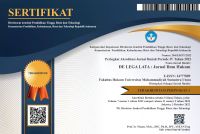Criminalization Policy in Realizing of Rupiah Sovereignty
Abstract
Sovereignty of the Rupiah is mandatory or grand design in Law Number 7 Year 2011 on The Currency, sovereignty of the Rupiah has resulted in the obligation to use Rupiah within the territory of the Republic of Indonesia in every payment transaction or business obligations. Every act that violates this obligation is responded by the law with punishment, while the times show that there are more acts of not using the Rupiah which not only occur in border areas but also in ordinary urban areas. This article discusses how the urgency of criminalization of Rupiah protection and how criminalization was formulated. The discussion is carried out with a normative approach to provide an overview of how criminalization was formulated in a law. The conclusion is that the use of the criminalization policy has urgency to protect the sovereignty of the Rupiah because actions that attack could result in economic instability which create various other types of criminal acts. Even so, the criminalization policy has not been formulated effectively because the details of the prohibited acts are too simple so that it creates interpretive bias, especially the ultimum remedium principle is not formulated so it is worrief that the formulation will contribute overcapacity in prison
Keywords
Full Text:
PDFReferences
Aaronson, E., & Shaffer, G. (2021). Defining Crimes in a Global Age: Criminalization as a Transnational Legal Process. Law & Social Inquiry, 46(2), 455486. https://doi.org/10.1017/lsi.2020.42
Arief, B. N. (2017). Bunga Rampai Kebijakan Hukum Pidana (Kedua). Kencana.
Arjona, C. S. (2019). The Usage of What Country: A Critical Analysis of Legal Ethics in Transnational Legal Practice. Canadian Journal of Law & Jurisprudence, 32(02), 259283. https://doi.org/10.1017/cjlj.2019.15
Baraggia, A., & Bonelli, M. (2022). Linking Money to Values: The New Rule of Law Conditionality Regulation and Its Constitutional Challenges. German Law Journal, 23(2), 131156. https://doi.org/10.1017/glj.2022.17
Disantara, F. P., Chansrakaeo, R., Jazuli, M., Ratnayutika, N. P., Triastutiek, R., & Umiasih, C. I. P. (2022). The Enigma of Ethics: Code of Ethics Enforcement on Covid-19 Health Protocol. DE LEGA LATA: Jurnal Ilmu Hukum, 7(1), 121. https://doi.org/10.30596/dll.v7i1.8203
Efendi, A., Susanti, D. O., & Tektona, R. I. (2019). Penelitian Hukum Doktrinal. Laksbang Justitia.
Herring, J. (2021). Criminal Law: The Basics (Second). Taylor & Francis.
Hidayatin, E. N., & Al Muchtar, S. (2020). Development of Law and Human Rights Awareness in Civics Education (Case Study of Law and Human Rights Awareness Students Forum (FPSH HAM) West Java). Journal of International Conference Proceedings, 3(1), 7380. https://doi.org/10.32535/jicp.v2i4.782
Kalokathis, N. G. (2019). Pre-Trial Discovery in Criminal Cases. Wyoming Law Journal, 17(2), 192199.
Koto, I. (2021a). Kewenangan Jaksa Dalam Melakukan Penggabungan Perkara Korupsi Dan Money Laundering (Studi Kejaksaan Tinggi Sumatera Utara). Iuris Studia: Jurnal Kajian Hukum, 2(2), 156162. https://doi.org/10.55357/is.v2i2.103
Koto, I. (2021b). Cyber Crime According to the ITE Law. International Journal Reglement & Society (IJRS, 2(2), 103110. https://doi.org/10.55357/ijrs.v2i2.124
Lee, Y. (2020). Criminalization, Legal Moralism, and Abolition. University of Toronto Law Journal, 70(2), 194215. https://doi.org/10.3138/utlj.2019-0142
Lindeboom, J. (2021). The Transformation of the Economic and Monetary Union: Solidarity, Stability, and the Limits of Judicial Authority. European Constitutional Law Review, 17(4), 753773. https://doi.org/10.1017/S1574019621000444
Mahrus, A. (2012). Dasar-dasar Hukum Pidana (2nd ed.). Sinar Grafika.
Melander, S. (2017). Criminalization and its limitations. Peking University Law Journal, 5(1), 5175. https://doi.org/10.1080/20517483.2017.1330809
N?mec, D., Kotlnov, E., Kotln, I., & Machov, Z. (2021). Corruption, Taxation and the Impact on the Shadow Economy. Economies, 9(1), 118. https://doi.org/10.3390/economies9010018
Pollock, J. M. (2020). Criminal Law. Taylor & Francis.
Ramadhani, R. (2018). Korelasi Hukum Antara Pengaturan Zonasi Wilayah dengan Pendaftaran Hak Milik atas Tanah di Kota Medan. EduTech: Jurnal Ilmu Pendidikan Dan Ilmu Sosial, 4(2), 4049. https://doi.org/http://dx.doi.org/10.30596%2Fedutech.v4i2.2275
Ramadhani, R., & Lubis, U. S. (2021). Opportunities and challenges for the Badan Pertanahan Nasional (BPN) in handling land cases in the new normal era. Legality : Jurnal Ilmiah Hukum, 29(1), 115. https://doi.org/10.22219/ljih.v29i1.14042
Santosa, I. D. B., & Khisni, A. (2017). Efektivitas Penegakan Hukum Pidana (Studi Terhadap Penegakan Hukum Kasus Pembuatan Pupuk Oplosan/Palsu yang Dilakukan oleh CV. Indo Agritama Industri Jepara). Jurnal Hukum: Khaira Ummah, 12(1), 1726.
Storey, T. (2017). Unlocking Criminal Law (6th ed.). Taylor & Francis.
Tan, C.-T., & Mohamed, A. (2020). MONETARY POLICY RULES IN MALAYSIA, SINGAPORE AND THAILAND. Buletin Ekonomi Moneter Dan Perbankan, 23(4), 565596. https://doi.org/10.21098/bemp.v23i4.1112
Turner, J. I. (2019). Managing Digital Discovery in Criminal Cases. Journal of Criminal Law and Criminology, 109(2), 237310.
Williams, C. C. (2014). Confroting the Shadow Economy: Evaluating Tax Compliance and Behaviour Policies. Edward Elgar.
DOI: https://doi.org/10.30596/dll.v7i2.10338
Refbacks
- There are currently no refbacks.
Address:
Faculty of Law, University of Muhammadiyah Sumatera Utara Jl. Kapten Mukhtar Basri No. 3 Medan, Kode Pos 20238
E-mail: delegalata@umsu.ac.id
Telp/HP/WA : 081262664567
DE LEGA LATA: Jurnal Ilmu Hukum is abstracting & indexing in the following databases:
De Lega Lata: Jurnal Ilmu Hukum is licensed under a Creative Commons Attribution-ShareAlike 4.0 International License.
Statcounter









